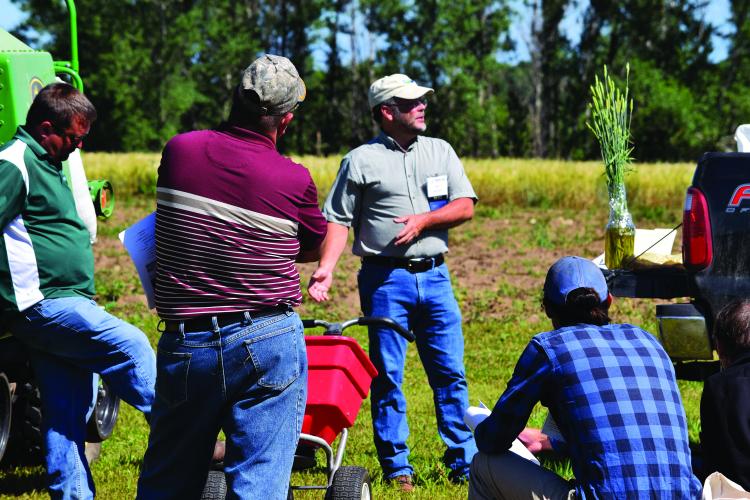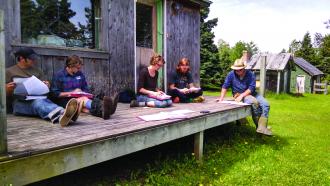Marquette Co-op Boosts Regional Food Hub


Developing the local food economy in a remote region is necessarily playing a long game.
During the past several years at Marquette Food Co-op, located in Michigan’s Upper Peninsula (U.P.), we have deepened our local food work through collaboration with Michigan State University and the Michigan Department of Agriculture. With these and other allies, we have created a virtual food hub, the Upper Peninsula Food Exchange. The Marquette Food Co-op coordinates food hub activities in the central of three U.P. regions and also acts as fiduciary agent for the entire project.
Food systems charter
The 2010 Michigan Good Food Summit, led by a Michigan State University agency now named the Center for Regional Food Systems (www.foodsystems.msu.edu), focused on agriculture and food processing, manufacturing, distribution, and retailing in Michigan. The result of that summit was a Good Food Charter and a plan for developing statewide food systems that aimed to make food healthy, green, fair, and affordable. (See that plan and subsequent progress here: www.michiganfood.org.)
The plan and charter made clear the need for the development of food hubs across the state. The National Good Food Network defines a food hub as “a business or organization that actively manages the aggregation, distribution, and marketing of source-identified food products primarily from local and regional producers in order to satisfy wholesale, retail, and institutional demand.” The Marquette Food Co-op and its board saw the co-op’s local food work as a good fit with the Michigan Good Food Charter—an opportunity to participate more meaningfully in local food work and to use its expertise.
That opportunity came in 2012 when the Michigan Department of Agriculture and Rural Development offered grants through the Center for Regional Food Systems for the development of five food hubs across the state. Marquette Food Co-op collaborated with Michigan State University (MSU) Extension on a proposal for hub development that focused on aggregation, distribution, new market creation, food safety, and education about regionally grown food in the Upper Peninsula of Michigan. The proposal was awarded funding of $165,000—and thus the Upper Peninsula Food Exchange (UPFE) was born.
One of the architects of the UPFE, Michelle Walk, an MSU Extension educator, stated: “The regional food system grant allowed us to move from small, local meetings to addressing barriers of expansion into the institutional market on a regional level and addressing issues that would have been difficult or cost-prohibitive for individual farms to address or coordinate.”
Upper Peninsula Food Exchange
The UPFE has three regions: east, central, and west. Marquette Food Co-op coordinates UPFE activity throughout the central region, while MSU Extension coordinates efforts in the east, and the Western Upper Peninsula Health Department facilitates the west end. Overall, Marquette Food Co-op acts as the fiduciary for all food hub development activities, managing the grant and channeling outside funds as needed.
UPFE is unique in the world of food hubs in that, rather than being a brick-and-mortar operation, it is primarily virtual. Natasha Lantz, former outreach and education director for the Marquette Food Co-op and a principle for UPFE, describes it this way, “UPFE serves as a resource portal for farmers, businesses, and individuals looking to connect with and actively participate in their local food system. Any entity or individual seeking information or an avenue of participation in the business or education of regional food system development in the U.P. may find it in UPFE”. A website (www.upfoodexchange.com) and an online newsletter, “The Plowshare,” help to disseminate local food information.
The website also hosts the “Upper Peninsula Food and Farm Directory,” formally published as a document by Marquette Food Co-op. The Directory lists location, growing practices, and crops raised by small farms and other food producers throughout the U.P. To support the distribution efforts of UPFE, aggregation sites were quickly facilitated in each region. Grant funds were used to build cold storage into the plans for an expanded co-op store in 2013 as well as in Harmony Health Foods, a small independent health food store in Sault Ste. Marie, located in the eastern region.
Additionally, for two years UPFE representatives hosted well-attended annual, educational Local Food Summits in each region to update communities on local food initiatives happening around them. Ken Meter of Crossroads Resource Center (www.crcworks.org), an experienced food systems analyst, was contracted via UPFE to do an analysis of agriculture in the U.P., bringing data to summit participants about the long road ahead for a more self-reliant food future for the region. (Here’s a link to a short film made by MSUE for the 2016 Good Food Summit that is inclusive of our role and work: http://foodsystems.msu.edu/resources/the-good-food-movement-in-the-upper....)
Online market and distribution
The cornerstone of UPFE is the Online Marketplace. This web-based exchange seeks to shrink distribution obstacles and mitigate the cold climate and geographic challenges of the U.P. by offering a single website where farms may upload their inventory for purchase by institutional buyers. Buyers browse products from many vendors at one site, alleviating the burden of contacting multiple brokers and vendors to meet their needs. In addition to connecting the buying and selling parties, UPFE allows producers to bring their products to physical aggregation sites for later pickup by the buyers. The Online Marketplace automates the invoicing for both the buyer and seller, making for accurate and well-documented transactions.
The conundrum of food system development is that all aspects must grow in unison and be developed at once. There is a continuing need both for farms to list inventory and for growth in buyers. Increased use of the site happens organically, albeit slowly. In 2015, $194,000 of produce moved through the site, and 14 percent growth is anticipated for 2016.
A critical mass of Online Marketplace users is necessary for effective distribution solutions to scale economically. There has been one recent favorable development relative to U.P. distribution: a willing partner has been identified in the Volwerth & Company out of Calumet, Mich.; the meat company’s trucks move throughout the U.P.
Food safety
A significant success of UPFE is food safety work, particularly as it pertains to the Food Safety Modernization Act of 2010—it is increasingly complex to get fresh food onto store shelves while navigating regulatory waters that bring increased liability. Local food sold in co-ops is often purchased directly from a farm. This arrangement works for CSAs and sales at farmers markets, but is not ideal for institutional or retail buyers. Food co-ops and other institutions must resell local food, and doing so shifts food safety liability to the buyer. Local food at a co-op is often not insured, certified, or vetted in a recognized or legal manner by a third party.
Enter GroupGAP certification. UPFE was chosen as one of five sites nationally to participate in a United States Department of Agriculture (USDA) pilot study for the efficacy of a national Group Good Agricultural Practices (GroupGAP) certification program. Beginning in 2012, UPFE under the guidance of quality control specialist Phil Britton, then a Marquette Food Co-op board member and now current sitting board president, devised a food safety quality management system based on the USDA Good Agricultural Practices (GAP) certification program. Britton stated, “The U.P. really pushed the envelope in terms of how far the GroupGAP model could be pushed, both in the small scale of farms that participated and the large geographic area they were spread throughout.”
GAP certification for small or very small-diversified farms is often unwieldy, and documentation requirements can ultimately make it unattainable, since it is designed for large monoculture operations. As part of the pilot, UPFE shepherded 10 of an initial 16 participating farms to full GAP certification in 2014. (See more on the GroupGAP pilot project here: http://foodsystems.msu.edu/resources/group_gap_pilot_upper_peninsula.)
With extensive communication, education, and training from Marquette Food Co-op and UPFE, vendors successfully began using the shared model to develop on-farm food safety plans. The guidelines developed by UPFE can be shared by multiple small farms under an umbrella system, through the newly introduced Group GAP certification program. Group certification means shared cost, systems, and practice, allowing full certification for group participants. The benefits of GAP certification are measurably improved farm operations and a subsequent opening of institutional markets otherwise not available to small farms.
Initially, the UPFE food safety program was less than popular with its small farm vendors when it began talking about required food safety protocol. But the farmers came around in the end, and the UPFE Group GAP initiative was so compelling that it attracted new partners in USDA and the Wallace Foundation at Winrock.
Setting the stage for continued development
The success of UPFE largely comes from the design of its shared structure. As more partners step in to participate in the hub and local food activities, Marquette Food Co-op is able to hand off parts to other agencies. For instance, UPFE recently transferred its “Farm & Food Directory” to Taste the Local Difference, a Michigan local-food marketing group. In truth, anyone may be a partner in UPFE. Native American tribes, municipal planners and policy writers, educators, students, and even state government all play their roles in continued hub development.
In addition, the partnership in UPFE has launched new careers in food and agriculture for several individuals. Phil Britton now works for Cherry Capital Foods, a large regional food distributor in Lower Michigan, administrating a statewide GroupGAP Network. Two former Marquette Food Co-op staffers involved with UPFE now work elsewhere—one runs a brick-and-mortar food hub in Durham, N.C., and another was hired to coordinate educational programs at the MSU Research Center in the U.P.
Today, the Marquette Food Co-op’s role in UPFE is largely limited to management of the Online Marketplace, maintaining the website and “Plowshare” newsletter, and answering infrequent phone calls.
Given that it began, practically speaking, from nothing, the Upper Peninsula Food Exchange is an unqualified success. Innovation not being invention, our success has not come without its struggles. Willing partners do not always make for supportive long-term players where change in community practice is concerned. But food systems and food hub development is a long game in the UP, with good outcomes essential to our fragile sustainable future.
Conclusive data, particularly with respect to purely economic results, may be light. Despite this, it cannot be denied that through the work of UPFE, huge gains have been made in setting the stage for continued development. In a region perennially neglected by state government and with a harsh climate, there has been a dramatic increase in necessary infrastructure, in regional community involvement, in food-related policy work, in support for greater agricultural capacity, and most importantly, in greater demand for local and regional food. The Marquette Food Co-op continues to approach its role in regional food systems development with two questions in mind: If not us, who? If not now, when? ♦
Matt Gougeon is general manager at Marquette Food Co-op (gm@marquettefood.coop). His previous report here was in early 2012.







